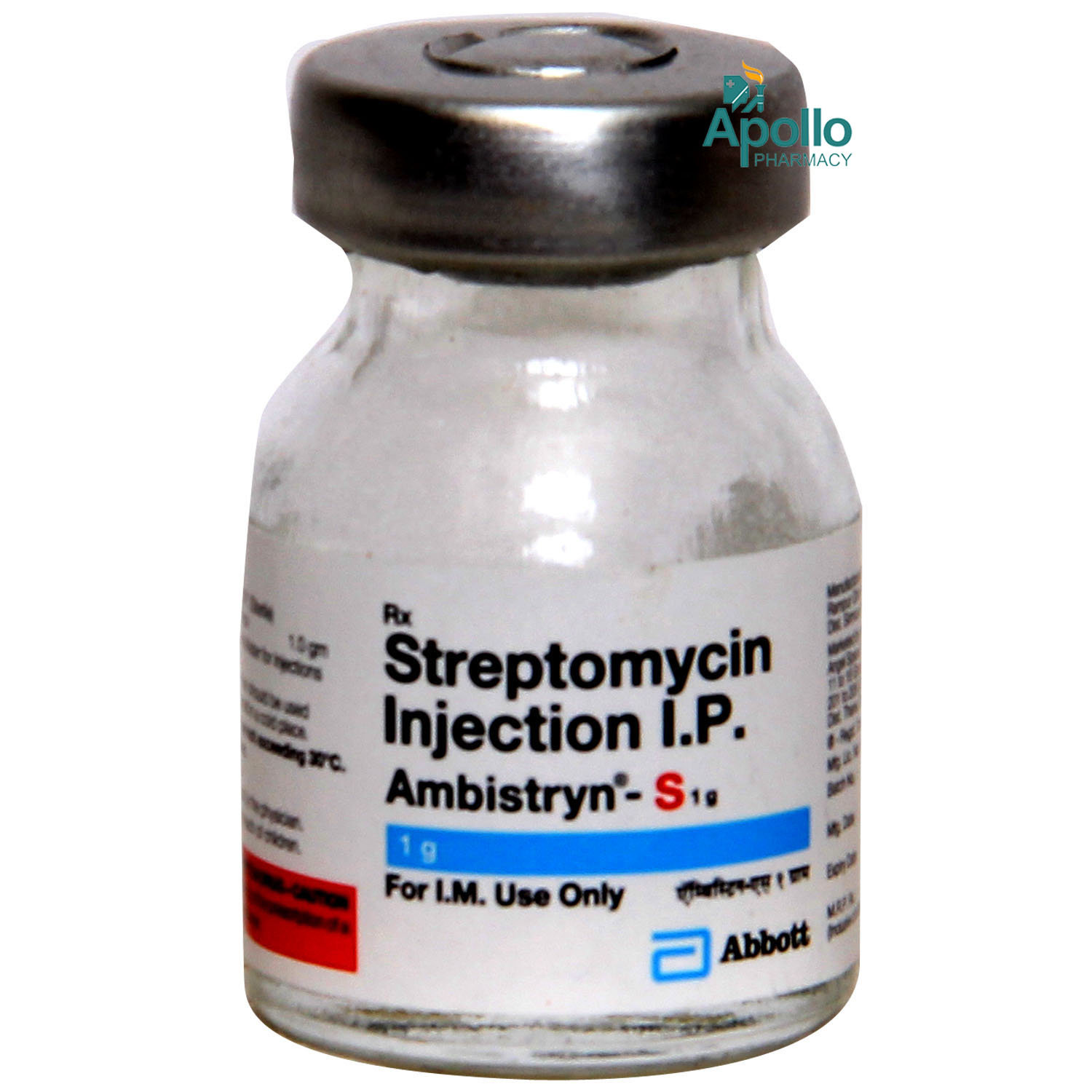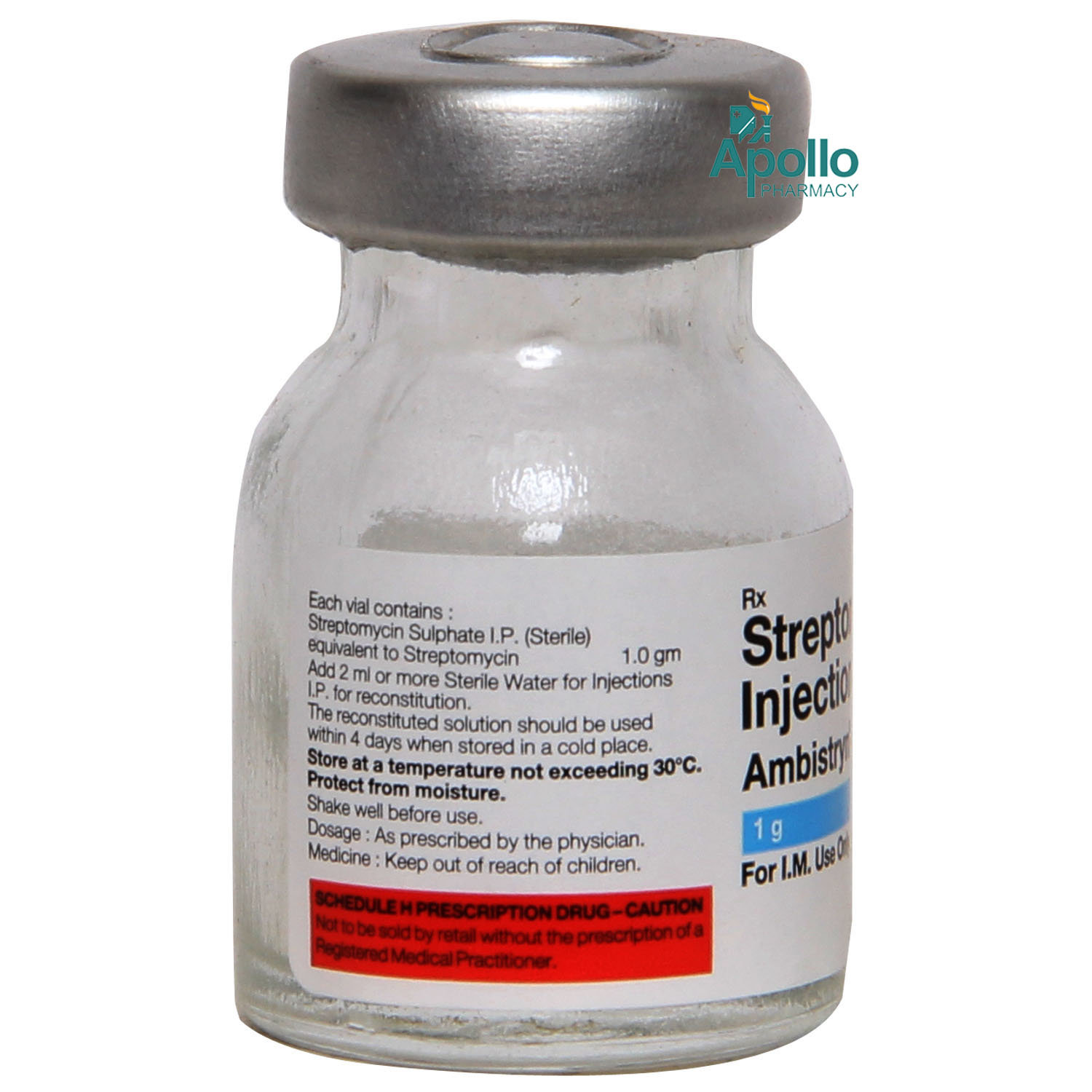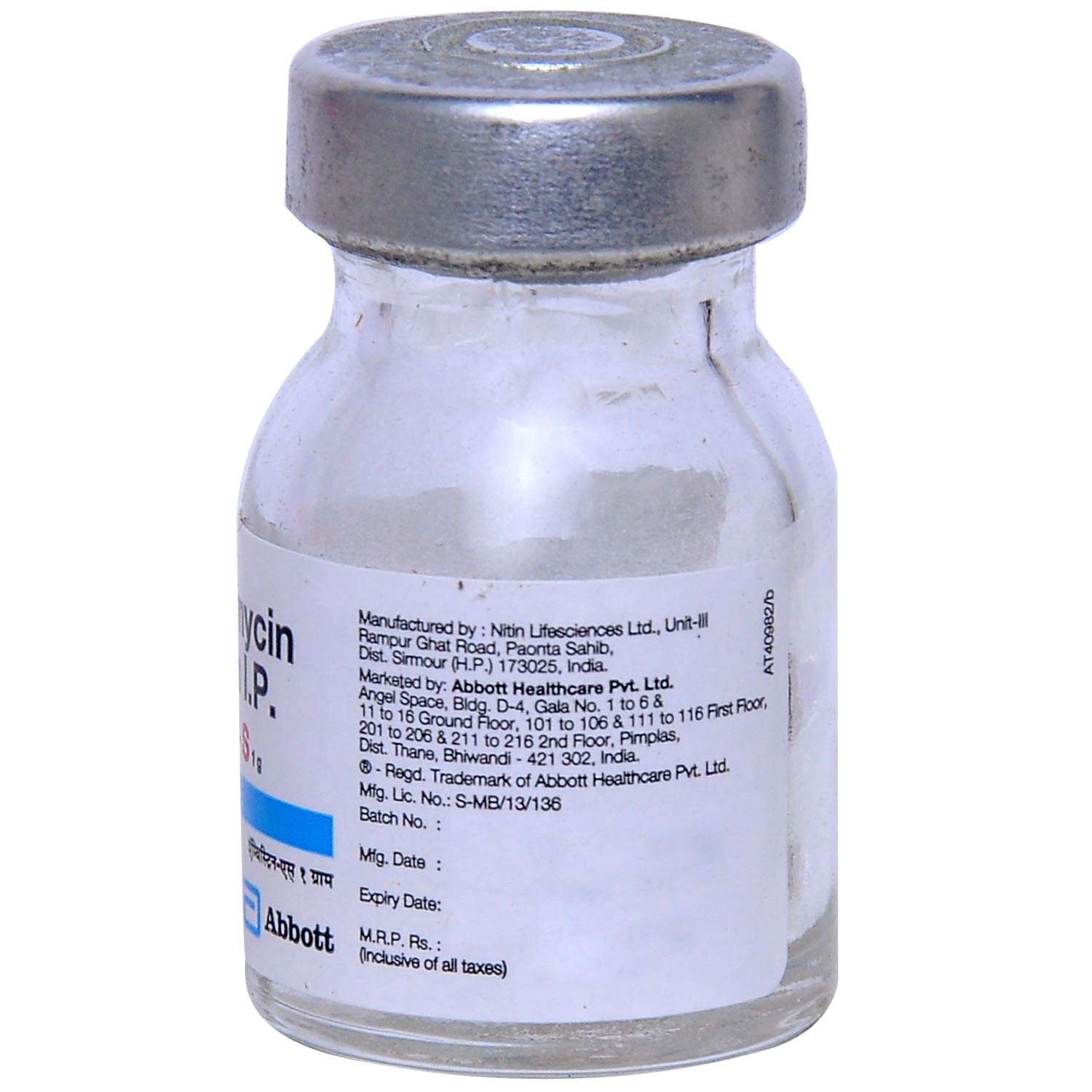Ambistryn S 1gm Injection



MRP ₹17
(Inclusive of all Taxes)
₹2.5 Cashback (15%)
know your delivery time
Provide Delivery Location
Composition :
Manufacturer/Marketer :
Consume Type :
Expires on or after :
Return Policy :

Secure Payment

Trusted by 8 Crore Indians

Genuine Products
Therapeutic Class
Country of origin
Manufacturer/Marketer address
Disclaimer
Alcohol
Safe if prescribed
Alcohol should not be taken along with Ambistryn S 1gm Injection, it might lead to excessive sleepiness, coughing and mucus formation.
Pregnancy
Consult your doctor
Ambistryn S 1gm Injection should not be used when pregnancy unless clearly necessary. So, inform your doctor if you are pregnant or suspect pregnancy. Your doctor will weigh the benefits and potential risks before prescribing Ambistryn S 1gm Injection.
Breast Feeding
Consult your doctor
Ambistryn S 1gm Injection is excreted in breast milk. Inform the doctor if you are a breastfeeding mother. Ambistryn S 1gm Injection is given to breastfeeding mothers only if the doctor thinks the benefits outweigh the risks.
Driving
Safe if prescribed
Drive with caution if you have taken Ambistryn S 1gm Injection as it might cause dizziness and make driving difficult.
Liver
Consult your doctor
Inform your doctor before receiving the Ambistryn S 1gm Injection if you have had a liver impairment/disorder history. Your doctor will prescribe only if the benefits outweigh the risks.
Kidney
Consult your doctor
Inform your doctor before receiving the Ambistryn S 1gm Injection if you have had a kidney impairment/disorder history. Your doctor will prescribe only if the benefits outweigh the risks.
Children
Safe if prescribed
Ambistryn S 1gm Injection should only be given to children if required. The dose should be monitored closely as an overdose to children may lead to unpleasant side effects.
About Ambistryn S 1gm Injection
Ambistryn S 1gm Injection belongs to the group of medicines called 'anti-tuberculosis', primarily used to treat and prevent bacterial infections like tuberculosis (TB), pneumonia, influenza, plague and other infections. Tuberculosis is an infectious bacterial disease that mainly affects the lungs but can also spread to other body parts such as the kidneys, brain, spine, and bone marrow. Ambistryn S 1gm Injection does not work against infections caused by the virus.
Ambistryn S 1gm Injection contains Streptomycin, an antibiotic that prevents the production of an enzyme known as mycolic acids by bacteria essential for cell wall formation (protective coating). Thereby, bacteria get killed without a cell wall and burst due to disruption in their metabolism. Thus, Ambistryn S 1gm Injection is effective against Mycobacterium tuberculosis, which causes TB (tuberculosis) and prevents further infection.
Take Ambistryn S 1gm Injection as prescribed by your doctor. You are advised to use Ambistryn S 1gm Injection for as long as your doctor has prescribed it based on your medical condition. Sometimes, you may experience a skin rash, vomiting, nausea, vertigo, fever and dizziness. Most of these side effects of Ambistryn S 1gm Injection do not require medical attention and gradually resolve over time. However, if the side effects persist or worsen, please consult your doctor.
Inform your doctor if you are allergic to Ambistryn S 1gm Injection or other medicines. Disclose your doctor before taking Ambistryn S 1gm Injection if you are pregnant or breastfeeding. Ambistryn S 1gm Injection may cause nerve problems, fits or optic neuritis (swelling of the optic nerve that may cause vision loss) in some people. Therefore, avoid driving if you experience these symptoms after taking Ambistryn S 1gm Injection. If you have diabetes, dehydration, kidney or liver problems, or have suffered from psychosis (mental disturbances), inform your doctor before taking Ambistryn S 1gm Injection.
Uses of Ambistryn S 1gm Injection
Medicinal Benefits Mweb
Key Benefits
Ambistryn S 1gm Injection contains Streptomycin, primarily used to treat and prevent bacterial infections like tuberculosis (TB), pneumonia, influenza and plague. It is an antibiotic that prevents the production of an enzyme known as mycolic acids by bacteria essential for cell wall formation (protective coating). Thereby, bacteria get killed without a cell wall and burst due to disruption in their metabolism. Thus, Ambistryn S 1gm Injection acts against a bacteria named Mycobacterium tuberculosis, which causes TB (tuberculosis), and prevents further infection.
Directions for Use
Side Effects of Ambistryn S 1gm Injection
- Skin rash
- Vomiting
- Nausea
- Vertigo
- Fever
- Dizziness
Drug Warnings
If you are known to be allergic to Ambistryn S 1gm Injection or any other medicines, please tell your doctor. If pregnant or breastfeeding, please inform your doctor before taking the Ambistryn S 1gm Injection. Ambistryn S 1gm Injection may cause mental health problems, fits or optic neuritis (swelling of the optic nerve that may cause vision loss) in some people. Therefore, avoid driving if you experience these symptoms after taking Ambistryn S 1gm Injection. If you have fits, diabetes, HIV infection, malnutrition, kidney or liver problems or have suffered from psychosis (mental disturbances), inform your doctor before taking Ambistryn S 1gm Injection. You must regularly undergo blood, urine and hearing tests while taking Ambistryn S 1gm Injection.
Drug-Drug Interactions
Drug-Drug Interactions
Login/Sign Up
Using cidofovir with Ambistryn S 1gm Injection can increase the risk or severity of kidney problems.
How to manage the interaction:
Taking Ambistryn S 1gm Injection with Cidofovir is not recommended, please consult your doctor before taking it. If you experience nausea, vomiting, loss of hunger, increased or decreased urination, sudden weight gain or weight loss, fluid retention, swelling, shortness of breath, bone pain, muscle cramps, tiredness, weakness, dizziness, confusion, irregular heart rhythm. Do not discontinue any medication without consulting a doctor.
Co-administration of Ambistryn S 1gm Injection with Tubocurarine may increase the risk or severity of side effects.
How to manage the interaction:
There may be a possibility of interaction between Ambistryn S 1gm Injection and Tubocurarine, but it can be taken if prescribed by a doctor. However, if you experience sudden dizziness, lightheadedness, fainting, shortness of breath, chest pain or tightness, rapid heartbeat, or increased heart rate, contact your doctor immediately. Do not discontinue any medications without consulting a doctor.
Co-administration of Human immunoglobulin with Ambistryn S 1gm Injection can increase the risk or severity of kidney problems.
How to manage the interaction:
Co-administration of Human immunoglobulin with Ambistryn S 1gm Injection can result in an interaction, but it can be taken if a doctor has advised it. However, if you experience nausea, vomiting, loss of appetite, increased or decreased urination, sudden weight gain or loss, fluid retention, swelling, shortness of breath, muscle cramps, tiredness, weakness, dizziness, confusion, or an irregular heart rhythm, consult a doctor. Do not discontinue any medications without consulting a doctor.
Co-administration of Ambistryn S 1gm Injection with Bumetanide can increase the levels and side effects of Ambistryn S 1gm Injection like hearing loss, ringing in the ears, vertigo, and kidney problems.
How to manage the interaction:
Co-administration of Ambistryn S 1gm Injection with Bumetanide can possibly result in an interaction, but it can be taken if your doctor has advised it. However, if you experience blurred vision, ringing in the ears, muscle cramps, loss of appetite, swelling via feet and ankles, dry, itchy skin, shortness of breath, trouble sleeping, decreased or increased urination, headaches, dizziness, nausea, vomiting, and diarrhea contact your doctor immediately. Do not stop using any medications without a doctor's advice.
Coadministration of Sirolimus with Ambistryn S 1gm Injection can increase the risk or severity of kidney problems.
How to manage the interaction:
Taking Ambistryn S 1gm Injection with Sirolimus can possibly result in an interaction, it can be taken if prescribed by your doctor. If you experience nausea, vomiting, loss of appetite, increased or decreased urination, sudden weight gain or weight loss, fluid retention, swelling, shortness of breath, bone pain, muscle cramps, tiredness, weakness, dizziness, confusion, irregular heart rhythm. Do not discontinue any medication without consulting a doctor.
Co-administration of Ambistryn S 1gm Injection with Vecuronium may increase the risk or severity of side effects.
How to manage the interaction:
Although taking Ambistryn S 1gm Injection and Vecuronium together can evidently cause an interaction, it can be taken if your doctor has suggested it. However, if you experience sudden dizziness, lightheadedness, fainting, shortness of breath, chest pain or tightness, rapid heartbeat, or irregular heart beats, contact your doctor immediately. Do not discontinue any medications without consulting a doctor.
Taking Torasemide together with Ambistryn S 1gm Injection may increase the risk or severity of kidney problems.
How to manage the interaction:
Although taking Ambistryn S 1gm Injection and torasemide together can possibly result in an interaction, it can be taken if your doctor has advised it. However, if you experience symptoms such as blurred vision, dry mouth, dry skin, frequent urination, nausea, and stomach pain, consult a doctor immediately. Do not discontinue any medications without consulting a doctor.
Co-administration of Ambistryn S 1gm Injection with Cisatracurium may increase the risk or severity of side effects like decreased breathing rate, irregular heart rhythms, or problems with movement and memory.
How to manage the interaction:
Co-administration of Ambistryn S 1gm Injection with Cisatracurium can possibly result in an interaction, but it can be taken if your doctor has advised it. However, if you experience sudden dizziness, lightheadedness, fainting, shortness of breath, chest pain or tightness, rapid heartbeat, or memory loss, contact your doctor immediately. Do not discontinue any medications without consulting a doctor.
Coadministration of Ambistryn S 1gm Injection and Tenofovir alafenamide can increase the risk of kidney problems.
How to manage the interaction:
Taking Ambistryn S 1gm Injection and Tenofovir alafenamide together can lead to an interaction, it can be taken if advised by your doctor. However, if you experience any symptoms like nausea, vomiting, loss of appetite, increased or decreased urination, sudden weight gain or weight loss, fluid retention, swelling, shortness of breath, bone pain, muscle cramps, tiredness, weakness, dizziness, confusion, and irregular heart rhythm, contact a doctor immediately. Do not discontinue any medications without consulting a doctor.
Coadministration of Deferasirox and Ambistryn S 1gm Injection can increase the risk or severity of kidney problems.
How to manage the interaction:
Although taking Deferasirox and Ambistryn S 1gm Injection together can cause an interaction, it can be taken if your doctor has suggested it. However, if you experience a fast heartbeat, anxiety, constipation, cough, dark urine, diarrhea, dizziness, lightheadedness, fainting, fever, hives or welts, itching skin or rash consult a doctor. Do not discontinue any medications without consulting a doctor.
Drug-Food Interactions
Drug-Food Interactions
Login/Sign Up
Drug-Diseases Interactions
Drug-Diseases Interactions
Login/Sign Up
Drug-Drug Interactions Checker List
- ASPIRIN
- AMOXICILLIN
- AZITHROMYCIN
- CIPROFLOXACIN
- DEXAMETHASONE
- VALPROIC ACID
- CARBAMAZEPINE
- PHENYTOIN
- SALBUTAMOL
Habit Forming
Special Advise
- If you have had a bad cough for the last three weeks or longer, chest pain, or coughing up blood or sputum from deep inside the lungs, consult a pulmonologist or lung specialist.
- Monitoring of liver function test (LFT) is advisable while using Ambistryn S 1gm Injection.
- Prolonged use of Ambistryn S 1gm Injection may cause nerve damage or hearing loss, especially if you have kidney disease.
- Before using Ambistryn S 1gm Injection, inform your doctor if you have dizziness, hearing problems, vision problem, balance problem, muscle weakness, trouble in concentration, numbness, tingling or watery/bloody stool (diarrhoea).
Diet & Lifestyle Advise
- Pineapple juice might help soothe the symptoms of cough and cold. It also has anti-inflammatory and mucolytic properties.
- Vitamin C-rich foods such as kiwi, broccoli, and bell pepper help improve the immune system.
- Avoid processed and fried foods.
- Warm ginger tea or warm soup can help relieve a cough.
- Avoid foods and drinks containing histamine or tyramine, such as cured meat, matured cheese, soya, tuna, salmon, mackerel, wine and beer.
- Quit smoking and avoid alcohol consumption.

Have a query?
Buy best Infections & Infestation products by
Cipla Ltd
Macleods Pharmaceuticals Ltd
Alkem Laboratories Ltd
Lupin Ltd
Abbott India Ltd
Sun Pharmaceutical Industries Ltd
Mankind Pharma Pvt Ltd
Micro Labs Ltd
Aristo Pharmaceuticals Pvt Ltd
FDC Ltd
Intas Pharmaceuticals Ltd
Glenmark Pharmaceuticals Ltd
Ipca Laboratories Ltd
Torrent Pharmaceuticals Ltd
Zydus Healthcare Ltd
Biochem Pharmaceutical Industries Ltd
Zuventus Healthcare Ltd
United Biotech Pvt Ltd
Hetero Drugs Ltd
Emcure Pharmaceuticals Ltd
Alembic Pharmaceuticals Ltd
Indoco Remedies Ltd
Fusion Health Care Pvt Ltd
Dr Reddy's Laboratories Ltd
Leeford Healthcare Ltd
Cadila Healthcare Ltd
Wockhardt Ltd
Zydus Cadila
GlaxoSmithKline Pharmaceuticals Ltd
Morepen Laboratories Ltd
Blue Cross Laboratories Pvt Ltd
Cadila Pharmaceuticals Ltd
Converge Biotech Pvt Ltd
Elder Pharmaceuticals Ltd
Hetero Healthcare Pvt Ltd
Pfizer Ltd
AAA Pharma Trade Pvt Ltd
Gufic Bioscience Ltd
Mylan Pharmaceuticals Pvt Ltd
Corona Remedies Pvt Ltd
Wallace Pharmaceuticals Pvt Ltd
Apex Laboratories Pvt Ltd
Medishri Healthcare Pvt Ltd
Akumentis Healthcare Ltd
Alniche Life Sciences Pvt Ltd
Hegde & Hegde Pharmaceutica Llp
Veritaz Healthcare Ltd
Ranbaxy Laboratories Ltd
Koye Pharmaceuticals Pvt Ltd
Shreya Life Sciences Pvt Ltd
Overseas Health Care Pvt Ltd
Biocon Ltd
Indchemie Health Specialities Pvt Ltd
Medley Pharmaceuticals Ltd
Brinton Pharmaceuticals Ltd
J B Chemicals & Pharmaceuticals Ltd
Unifaith Biotech Pvt Ltd
Ajanta Pharma Ltd
Biochemix Health Care Pvt Ltd
Natco Pharma Ltd
Samarth Life Sciences Pvt Ltd
Unichem International
Laborate Pharmaceuticals India Ltd
Unipark Biotech Pvt Ltd
Zymes Bioscience Pvt Ltd
Indiabulls Pharmaceuticals Pvt Ltd
Neon Laboratories Ltd
Vasu Organics Pvt Ltd
DR Johns Lab Pharma Pvt Ltd
East West Pharma India Pvt Ltd
La Renon Healthcare Pvt Ltd
Medgen Drugs And Laboratories Pvt Ltd
Novartis India Ltd
Canixa Life Sciences Pvt Ltd
Icarus Health Care Pvt Ltd
Lincoln Pharmaceuticals Ltd
Celon Laboratories Pvt Ltd
Concept Pharmaceuticals Ltd
Klm Laboratories Pvt Ltd
Nicholas Piramal India Ltd
Systopic Laboratories Pvt Ltd
Yuventis Pharmaceuticals
Capital Pharma
German Remedies Ltd
Pristine Pearl Pharma Pvt Ltd
Unison Pharmaceuticals Pvt Ltd
Aurz Pharmaceutical Pvt Ltd
Clover Health Care Pharma
Kepler Healthcare Pvt Ltd
Allites Life Sciences Pvt Ltd
Auspharma Pvt Ltd
Intra Life Pvt Ltd
Jolly Healthcare
Linux Laboratories Pvt Ltd
Ozone Pharmaceuticals Ltd
Cachet Pharmaceuticals Pvt Ltd
Comed Chemicals Ltd
Delcure Life Sciences Ltd
Fresenius Kabi India Pvt Ltd
Khandelwal Laboratories Pvt Ltd

